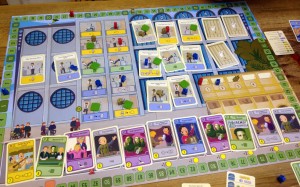Review: Copycat
Posted by James (admin) on August 21st, 2013
 Friedmann Friese’s game of Copycat has the players trying to win votes in an election and which knowingly uses game mechanics from Dominion, Through the Ages and Agricola (with permission from their respective designers too). I’m always interested in Friese’s designs as there’s usually some unusual game mechanic or twist within them – they don’t always work for me but they’re much more often hits than misses.
Friedmann Friese’s game of Copycat has the players trying to win votes in an election and which knowingly uses game mechanics from Dominion, Through the Ages and Agricola (with permission from their respective designers too). I’m always interested in Friese’s designs as there’s usually some unusual game mechanic or twist within them – they don’t always work for me but they’re much more often hits than misses.
Essentially, Copycat game is a mix of worker placement and deck building. The player that gains the most votes (VPs) by the end of the game wins and the game ends after 10 rounds or when specific final cards have been bought. Each player has their own deck of cards (identical at the start) and each round players draw 5 cards from their decks. Each card has a number on it and, the first action of each round, is to simultaneously discard one card using the number on it to determine turn order. More powerful cards have higher numbers, so you have to balance using a good card to go first against using a card for its more powerful effect.
With turn order established, players take turns placing their 3 workers on the action spaces on the board. Only one worker can be placed on each action so there’s a definite race to grab the actions you want. Once all workers have been placed, players take turns resolving their actions and using the cards in their hand. The different action spaces allow players to gain money for that round, gain VPs, draw more cards, exchange cards for other cards or cash, buy cards, etc. The cards you have in your hand inform which actions you want to aim for too, i.e. if you’ve got little cash you may want to grab the +2 cash action, or maybe forget buying cards this round and focus on other areas.
Some cards score immediate VPs, some are worth cash and others give various abilities like use 2 additional workers this round, place a worker on an action space that is already occupied, and so on. Players can use the combined cash on their cards as well as any from placing workers to buy any of the cards at the bottom of the board; however, a player will need to have a worker on a buy action for each card they want to buy. Like Dominion, bought cards get added to your discard pile (as do all the cards you had in hand this turn) so these cards will be part of your hand in some future turns.
As the game continues, the power of the cards that can be bought increases, plus 1 new worker action space is added to the board each round so there is a nice progression to the game. Also, any action spaces not used during a round have a bonus VP added to them each round so they become more interesting and/or tempting.
 Overall, I enjoyed playing Copycat – the elements of Dominion’s deck-building combined with worker placement was entertaining. There were plenty of decisions to be made, especially working out which actions I wanted to combine based on my cards and which actions I should grab first (and usually followed by working out which actions I now needed to grab once another player had taken what I had hoped to).
Overall, I enjoyed playing Copycat – the elements of Dominion’s deck-building combined with worker placement was entertaining. There were plenty of decisions to be made, especially working out which actions I wanted to combine based on my cards and which actions I should grab first (and usually followed by working out which actions I now needed to grab once another player had taken what I had hoped to).
As with any deck-building game, luck of the draw plays its part in what you do each round. The cards in your deck will reach your hand but there is luck about in what combination they appear and some combinations are more useful than others. I don’t mind this too much as it tends to even itself out and you have some power to influence what gets added to (and removed from) your deck. Also, you know what cards you have before you select actions so you can adjust to play to the strength and/or requirements of the cards in your hand.
There’s little downtime as players take turns placing workers, and it doesn’t take long to execute your cards and actions on your turn. Player interaction mainly comes in the form of denial as players grab action spaces and buy cards before their opponents can do the same.
I liked the cartoony artwork used for the game (similar to that of Power Grid and Factory Manager) and the pictures on the cards and board show a dry sense of humour too. (One for a minor PR campaign shows an election poster with Friedmann Friese’s face on it posted in the street and, below it, a small dog is urinating on it.) Also, a nice extra touch was the inclusion of an achievements sheet which lets players record when they complete certain things during a game (a bit like you get in an Xbox game). Friese included one of these in Power Grid: The First Sparks which I thought was a neat idea then too.
Drawing lots of cards did seem to be a major advantage as it gives you more options and/or buying power during a turn, i.e. more cash to spend, more VPs, more special actions like placing more workers, etc. I followed the tactic I’ve used in Dominion and bought several cards that allowed me to draw extra cards which I found came up a lot and often chained together. As a result, I twice managed to draw my entire deck in a single round. One player who was not able to purchase the ‘extra card draw’ cards as early on certainly seemed to suffer for not doing so. I think there may be other tactical routes like focusing on buying the cards that earn lots of VPs but I suspect having cards that let you draw more cards (as well as place more workers which I also had) is pretty essential to any tactical route – I would need to play more to find out though.
I got the impression that there was a bit of a runaway effect in Copycat – having lots of cards (especially powerful cards) means you’re more likely to gain even more (and more powerful) cards and more VPs, so it’s important to gain these early or be left behind. Also, a few of the cards seemed very powerful in combination such as the one that doubles your cash that round when combined with purchasing the card that converts cash into VPs.
My only concern with Copycat is that it may feel quite similar when replayed. The cards that can be purchased, and the extra actions that become available each round, will arrive in a different order each game, but I’m not sure that will make a vast difference to the general feel and tactics.
In the end, I enjoyed playing Copycat and I definitely want to play it again.
James.
[Played with 3 players]

